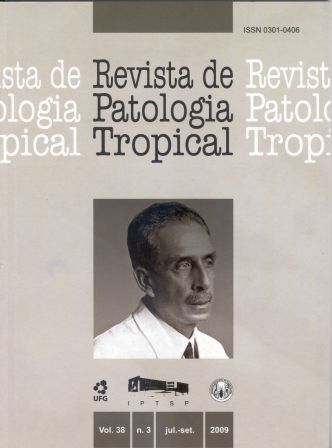AVALIAÇÃO DA RESISTÊNCIA ANTIMICROBIANA ASSOCIADA EM ISOLADOS CLÍNICOS DE Klebsiella spp, Escherichia coli, Enterobacter spp EM UM HOSPITAL PÚBLICO DE GOIÂNIA, GO-BRASIL
DOI:
https://doi.org/10.5216/rpt.v38i3.8123Palavras-chave:
Klebsiella spp, Escherichia coli, Enterobacter spp, Resistência antimicrobiana associada.Resumo
A determinação do nível de resistência em patógenos bacterianos associada a várias classes de drogas tem grande importância, especialmente para auxiliar nos protocolos terapêuticos. Entre janeiro de 2006 e dezembro de 2008, foi realizada uma análise retrospectiva de dados de suscetibilidade
in vitro para uma ampla variedade de antimicrobianos com o fim de quantificar a resistência associada a um antimicrobiano na presença e ausência de resistência a outros em isolados de Escherichia coli (n = 515), Klebsiella spp (n = 653) e Enterobacter spp (n = 507). Entre os isolados de Klebsiella spp e E. coli, produtores de ESBL (54,7% - 357/653 e 15,3% - 79/515, respectivamente), foram observadas significantes taxas de resistência associada aos antimicrobianos não relacionados – aminoglicosídeos, ciprofloxacina e sulfametoxazol-trimetoprim. A resistência de Enterobacter spp à cefepima foi associada com um marcante aumento na resistência a todos os outros agentes testados (superior a 80%), exceto à ampicilina-sulbactam (58,7%). Estes dados claramente indicam que a resistência associada não é limitada a uma combinação de uma droga em particular, mas é um evento geral que demonstra a necessidade de maior cautela com relação à terapia empírica, uma vez que é um problema clínico relevante com relação às opções terapêuticas que são afetadas pela presença de resistência associada a drogas não relacionadas.
Downloads
Downloads
Publicado
Como Citar
Edição
Seção
Licença
The manuscript submission must be accompanied by a letter signed by all authors stating their full name and email address, confirming that the manuscript or part of it has not been published or is under consideration for publication elsewhere, and agreeing to transfer copyright in all media and formats for Journal of Tropical Pathology.

